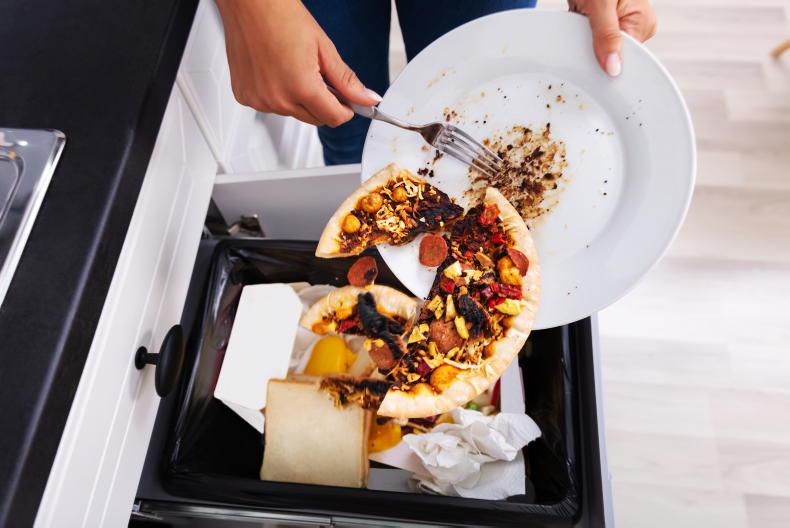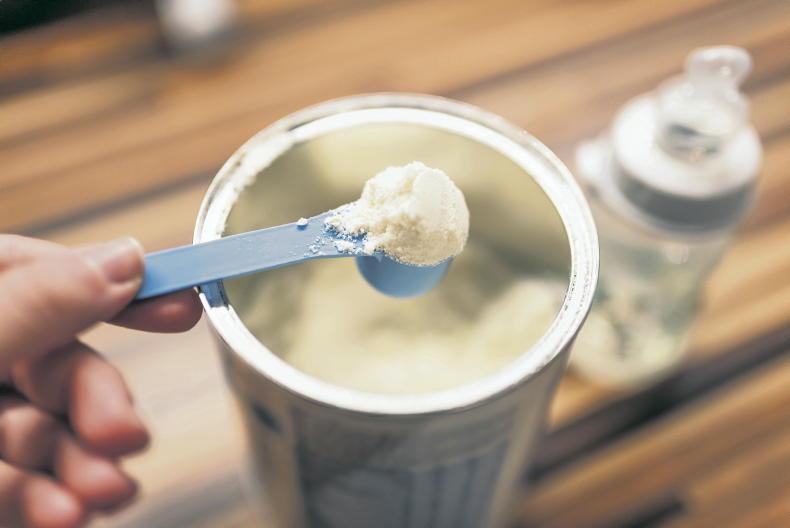What does 1.5°C of global warming look like? Over half a decade, it will mean more heatwaves, flooding and intense storms.
The look and feel of our Irish landscape and our unique ecosystems are likely to change, affecting how our crops grow.
When the Intergovernmental Panel on Climate Change released its report in August, it was a sit-up-and-listen moment for many.
We all thought: “What can I do to make a difference?”
When any new report on climate change is released, there is always a focus on the role of agriculture and what farmers must do. But every single consumer has a role to play everyday, especially when it comes to food waste.
Wednesday 29 September was International Day of Awareness of Food Loss and Waste, but it’s something we need to be aware of every day. We need to change our thinking.
Let’s take a 12-pack of sausages. Six are used for the weekend breakfast but you forget to freeze the rest. As you clear your fridge for the weekly shop, you discard them in the bin. At least you ate half you think to yourself, it’s just a few sausages. But it’s not just the sausages that are wasted. All the resources that were used to produce this food – including water, land, energy, labour and capital – go to waste.
Each piece of food waste adds up, amounting to over 930m tonnes of food being wasted across the world. That is just the food sold to households, retailers, restaurants and other food services. It doesn’t even take into account the food lost during production and distribution.
What can we do to eliminate food waste?
Best before v use by
If there is just one piece of information you take from this article, it’s learning the difference between best before and use by dates. Use by is about the safety of food. Food should not be consumed after the date displayed because it’s not safe to eat. It applies to perishable foods like dairy and meat.
Best before is a completely different term. It refers to the quality of the food. If the food is stored correctly, it often can be eaten well after that date, it just might not taste at its optimum. Think about a packet of biscuits – if it’s been stored correctly, it is most likely OK to eat.
Plan, plan, plan
Three quarters of Irish consumers make a shopping list before their weekly shop, but how detailed is that list? If you’re just writing down the usuals then maybe it’s time to get more focused. Make a grid detailing the meals that you are going to have during the week. On a separate page, list the ingredients that you need for each meal. Then stick to list. You may find it easier to shop online, that way you won’t be tempted by anything extra. As well as reducing food waste, it will be better for your pocket.
Empty the fridge night
According to the Environmental Protection Agency, bread is the food thrown out most often, with 41% of people admitting to it. This is followed by vegetables (39%), fruit (39%) and salad (32%). Plan a leftover night when doing you’re weekly shopping list. That’s a night where you get creative making a sauce, stew, omelette or even a pizza using whatever is left in the fridge. And whizz up those breadcrumbs for a nice bit of stuffing in the Sunday roast.
Control your portions
You wouldn’t eat a curry that has been on someone’s plate but you’d happily freeze the leftovers from the pot, so watch portion sizes and don’t load up the plate. If a family member is hungry, they can always go back for more. When you have people over for dinner and you don’t know what portion sizes they usually have, serve everything family style so people can help themselves.
Buy the wonky carrots
The WWF Driven to Waste campaign is calling for transparency across the board when it comes to food waste. As part of the campaign, UK farmers said about 25% of their carrots were wasted due to cosmetic rejections. Furthermore, six in 10 farmers said they “overproduce because there is pressure to always meet buyers orders or risk losing contracts”. As consumers, we need to get more comfortable buying the wonky carrots. They taste the same, they may just look a bit different. Feed this info back at your local farmers’ markets, in the vegetable shops and even in your supermarket and let them know you’re happy buying wonky veg.
The UN Environmental Programme’s 2021 Food Waste Index Report measured 931 million tonnes of food sold to households, retailers, restaurants and other food services each year, which means 17% of all food available at consumer level is currently wasted.According to the European Food Information Council, food waste is currently responsible for 8-10% of global greenhouse gas emissions. If food loss and waste were a country, it would be the third-largest greenhouse gas-emitting country in the world, releasing more greenhouse gases than any single country in the world except China and the US.
A very cool initiative has just launched in Dublin and we hope to see this movement gather pace and spread beyond the capital. Too Good To Go is the world’s biggest marketplace for surplus food. The way it works is that at the end of the working day, businesses put together a ‘Surprise Bag’ of food which consumers can purchase on the Too Good To Go app for a third of the price that the food was previously sold for. Businesses are selling the food that otherwise would be going to waste at the end of the day, and consumers get to discover new foods and businesses at a fraction of the price – all this is good for the environment, given that food waste is responsible for 10% of greenhouse gases.
Three Dublin city businesses have already signed up: KC Peaches, Tang and Camerino bakery with more expected to follow.
Too Good To Go co-founder Jamie Crummie says: “When we think of tackling huge global problems, the task can feel daunting. Too Good To Go provides a simple, tangible action that will empower Irish app users to contribute to the fight as part of their daily behaviours. By buying a Surprise Bag on their way home from work or on their way to meet friends, they’re doing their part and getting some delicious food in the process.”
The app, which already has more than 40m active users in 16 other international markets, has empowered people to save more than 91 million meals since 2016. In 2020 alone, Too Good To Go welcomed over 50,000 new partners and saved more than 28m meals from going to waste.
If you’re a business owner and would like to get involved, there is an option in the help section of the app where you can sign up.
The easy-to-use Too Good To Go app is available for iOS download in the Apple App Store and Google Play for Android.
Read more
Ireland generates 1.1m tonnes of food waste every year
Department ring-fences €180k for food waste solutions
What does 1.5°C of global warming look like? Over half a decade, it will mean more heatwaves, flooding and intense storms.
The look and feel of our Irish landscape and our unique ecosystems are likely to change, affecting how our crops grow.
When the Intergovernmental Panel on Climate Change released its report in August, it was a sit-up-and-listen moment for many.
We all thought: “What can I do to make a difference?”
When any new report on climate change is released, there is always a focus on the role of agriculture and what farmers must do. But every single consumer has a role to play everyday, especially when it comes to food waste.
Wednesday 29 September was International Day of Awareness of Food Loss and Waste, but it’s something we need to be aware of every day. We need to change our thinking.
Let’s take a 12-pack of sausages. Six are used for the weekend breakfast but you forget to freeze the rest. As you clear your fridge for the weekly shop, you discard them in the bin. At least you ate half you think to yourself, it’s just a few sausages. But it’s not just the sausages that are wasted. All the resources that were used to produce this food – including water, land, energy, labour and capital – go to waste.
Each piece of food waste adds up, amounting to over 930m tonnes of food being wasted across the world. That is just the food sold to households, retailers, restaurants and other food services. It doesn’t even take into account the food lost during production and distribution.
What can we do to eliminate food waste?
Best before v use by
If there is just one piece of information you take from this article, it’s learning the difference between best before and use by dates. Use by is about the safety of food. Food should not be consumed after the date displayed because it’s not safe to eat. It applies to perishable foods like dairy and meat.
Best before is a completely different term. It refers to the quality of the food. If the food is stored correctly, it often can be eaten well after that date, it just might not taste at its optimum. Think about a packet of biscuits – if it’s been stored correctly, it is most likely OK to eat.
Plan, plan, plan
Three quarters of Irish consumers make a shopping list before their weekly shop, but how detailed is that list? If you’re just writing down the usuals then maybe it’s time to get more focused. Make a grid detailing the meals that you are going to have during the week. On a separate page, list the ingredients that you need for each meal. Then stick to list. You may find it easier to shop online, that way you won’t be tempted by anything extra. As well as reducing food waste, it will be better for your pocket.
Empty the fridge night
According to the Environmental Protection Agency, bread is the food thrown out most often, with 41% of people admitting to it. This is followed by vegetables (39%), fruit (39%) and salad (32%). Plan a leftover night when doing you’re weekly shopping list. That’s a night where you get creative making a sauce, stew, omelette or even a pizza using whatever is left in the fridge. And whizz up those breadcrumbs for a nice bit of stuffing in the Sunday roast.
Control your portions
You wouldn’t eat a curry that has been on someone’s plate but you’d happily freeze the leftovers from the pot, so watch portion sizes and don’t load up the plate. If a family member is hungry, they can always go back for more. When you have people over for dinner and you don’t know what portion sizes they usually have, serve everything family style so people can help themselves.
Buy the wonky carrots
The WWF Driven to Waste campaign is calling for transparency across the board when it comes to food waste. As part of the campaign, UK farmers said about 25% of their carrots were wasted due to cosmetic rejections. Furthermore, six in 10 farmers said they “overproduce because there is pressure to always meet buyers orders or risk losing contracts”. As consumers, we need to get more comfortable buying the wonky carrots. They taste the same, they may just look a bit different. Feed this info back at your local farmers’ markets, in the vegetable shops and even in your supermarket and let them know you’re happy buying wonky veg.
The UN Environmental Programme’s 2021 Food Waste Index Report measured 931 million tonnes of food sold to households, retailers, restaurants and other food services each year, which means 17% of all food available at consumer level is currently wasted.According to the European Food Information Council, food waste is currently responsible for 8-10% of global greenhouse gas emissions. If food loss and waste were a country, it would be the third-largest greenhouse gas-emitting country in the world, releasing more greenhouse gases than any single country in the world except China and the US.
A very cool initiative has just launched in Dublin and we hope to see this movement gather pace and spread beyond the capital. Too Good To Go is the world’s biggest marketplace for surplus food. The way it works is that at the end of the working day, businesses put together a ‘Surprise Bag’ of food which consumers can purchase on the Too Good To Go app for a third of the price that the food was previously sold for. Businesses are selling the food that otherwise would be going to waste at the end of the day, and consumers get to discover new foods and businesses at a fraction of the price – all this is good for the environment, given that food waste is responsible for 10% of greenhouse gases.
Three Dublin city businesses have already signed up: KC Peaches, Tang and Camerino bakery with more expected to follow.
Too Good To Go co-founder Jamie Crummie says: “When we think of tackling huge global problems, the task can feel daunting. Too Good To Go provides a simple, tangible action that will empower Irish app users to contribute to the fight as part of their daily behaviours. By buying a Surprise Bag on their way home from work or on their way to meet friends, they’re doing their part and getting some delicious food in the process.”
The app, which already has more than 40m active users in 16 other international markets, has empowered people to save more than 91 million meals since 2016. In 2020 alone, Too Good To Go welcomed over 50,000 new partners and saved more than 28m meals from going to waste.
If you’re a business owner and would like to get involved, there is an option in the help section of the app where you can sign up.
The easy-to-use Too Good To Go app is available for iOS download in the Apple App Store and Google Play for Android.
Read more
Ireland generates 1.1m tonnes of food waste every year
Department ring-fences €180k for food waste solutions











SHARING OPTIONS